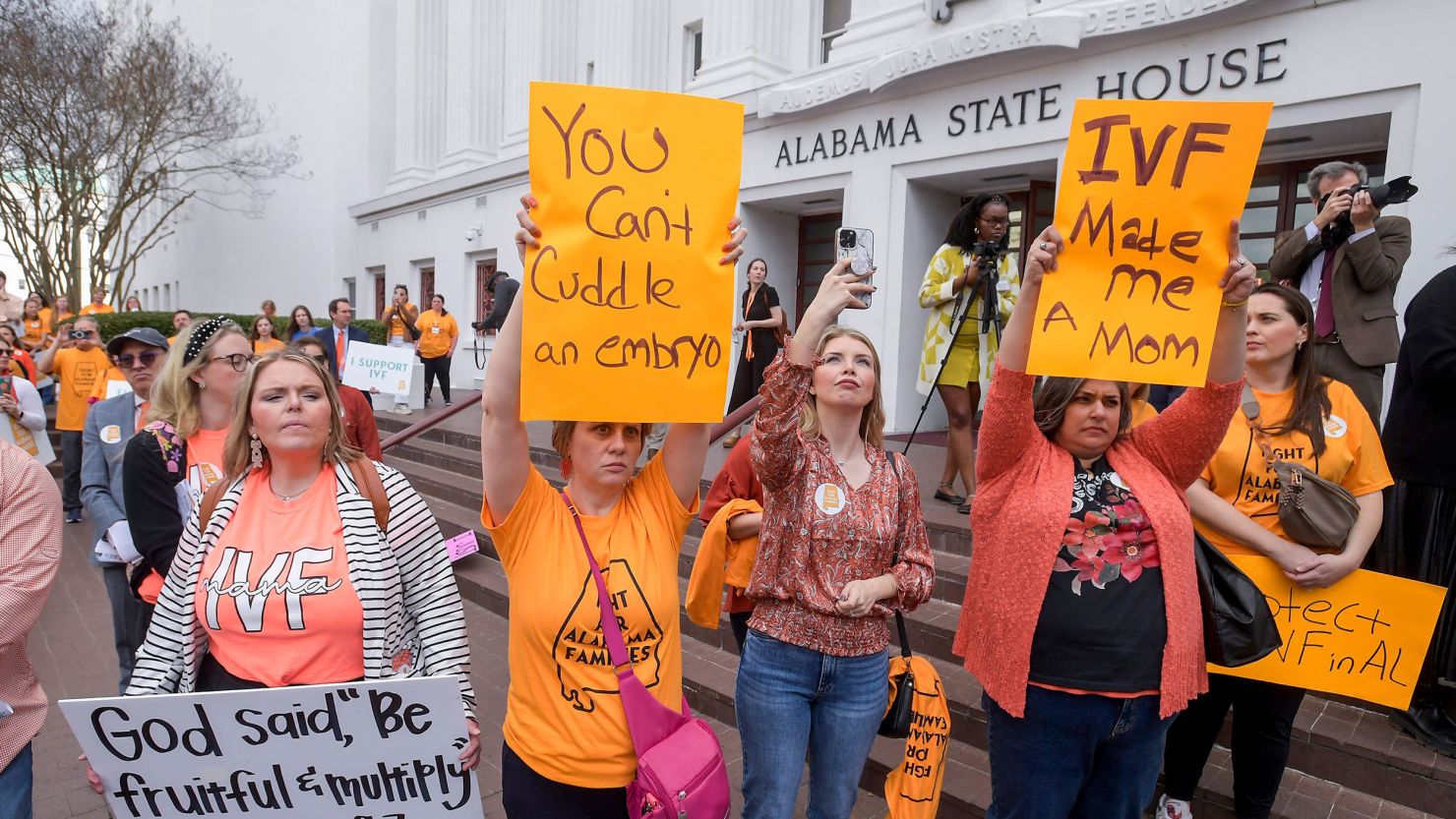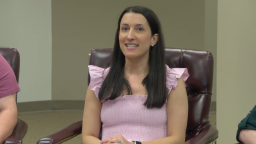Providers in Alabama are resuming some in vitro fertilization services Thursday, the day after the state’s Republican governor signed a bill into law aimed at protecting IVF patients and providers from the legal liability imposed on them by a controversial state Supreme Court ruling.
The new law does not address the issue of personhood at the heart of last month’s unprecedented ruling, which prompted some providers to halt some IVF services, and experts say it’s going to take more work to fully protect fertility services in the state.
The Alabama Supreme Court ruled last month that frozen embryos are human beings and those who destroy them can be held liable for wrongful death. Three of the state’s limited pool of IVF providers immediately paused services, sending some families out of state to access treatment and prompting a widespread and urgent demand for lawmakers to provide a fast fix.
The new legislation, which passed in the majority Republican Alabama House and Senate late Wednesday before Gov. Kay Ivey?signed it into law, aims to provide civil and criminal immunity to providers and patients for the destruction or damage to embryos. The legislation will apply retroactively.
Under the?new law,?“manufacturers of goods used to facilitate the in vitro process” or the “transport of stored embryos” also are provided with?criminal immunity.
While two of the three providers who halted IVF services are resuming those treatments, the third – the clinic at the center of the state Supreme Court case – told CNN the new legislation falls short of providing the legal protection it needs to resume care.
Gabbie Price, who uprooted her life and career in order to afford IVF, told CNN on Thursday she was relieved the new legislation passed, but called the law a “Band-Aid.”
“I do feel like there’s a lot that needs to be addressed still – and I think a lot of other people feel that way as well – but with IVF being such a time-sensitive procedure, there are so many families that can’t wait,” Price said. “We had to get something in place for those families that could not wait.”
Still, the law “does not nullify the Supreme Court’s analysis that says the law ought to treat embryos just like people,” Katherine Kraschel, an assistant professor at Northeastern University School of Law, told CNN on Tuesday.
Experts have expressed concern that while the Republican-backed legislation protects providers from liability when it comes to the destruction of embryos, it could also insulate them from standard medical malpractice claims.
The Alabama House Democratic Caucus?said the new legislation is “short-sighted and does not adequately address the many legal questions of embryonic personhood, nor the serious consequences of the unprecedented and dangerous Alabama Supreme Court ruling.”
“Simply put, this legislation is not a solution,” its statement read. “It serves only to avoid a reckoning, at the cost of extending the complications of the Alabama Supreme Court’s ruling.”
State Sen. Larry Stutts, a Republican and the lone lawmaker who voted against the measure in the state Senate, criticized the language in the bill, arguing it is “not an IVF protection bill, it’s an IVF provider and supplier protection bill” that is “limiting the ability of the mothers that are involved in IVF to have recourse.”
US Sen. Tammy Duckworth, a Democrat who proposed a national IVF protection bill that was blocked last week, was also critical of the new law.
“I’m disappointed that Republican state legislators in Alabama refused to work in a bipartisan way to pass a real solution to this Republican-created crisis that makes it clear: an embryo is?not?a human being,” Duckworth told CNN in a statement Thursday.
Alabama state Rep. Terri Collins and Sen. Tim Melson, Republicans who introduced the state legislation, have noted it was intended to provide immediate relief for families who have lost access to IVF services, while officials consider more permanent solutions.
“This addresses the imminent problem and that is what I am trying to do today. Do we need to have the longer decision? Yes, we do,” Collins said last week.
“This is the?temporary?fix,”?Melson said last week. “This gets the ladies now currently in the situation, that are in limbo, back in the clinic.”
Ivey similarly acknowledged the new law was a quick fix after the court ruling and noted “there will be more work to come” on IVF protections.
“I am pleased to sign this important, short-term measure into law so that couples in Alabama hoping and praying to be parents can grow their families through IVF,” Ivey said in a statement late Wednesday. “IVF is a complex issue, no doubt, and I anticipate there will be more work to come, but right now, I am confident that this legislation will provide the assurances our IVF clinics need and will lead them to resume services immediately.”
IVF patients express cautious relief
Price cited concerns that the broad immunity meant to protect providers from liability could leave patients without regulations needed to keep them safe from possible medical malpractice.
“It does make me a little nervous, and it does make me wonder if it’s going to be harder for those people fighting for those regulations to get them,” she said.
Elizabeth Goldman felt like she’d been living in limbo as her IVF treatments were halted. The uterus transplant recipient, who sold her home and moved to Birmingham to start a family, said she was “thankful” to lawmakers for coming together quickly and helping clinics reopen.
“This has been an extremely stressful and scary 2 1/2 weeks waiting in limbo while my IVF clinic has been shut down,” Goldman told CNN, saying she’d watched every step of the legislation’s passing and now feels hopeful her “journey can continue after my clinic reopens.”
Gabrielle Goidel invested more than $20,000 into IVF treatment in Alabama, before her clinic halted IVF services and she and her husband had to leave the state to continue treatment. She said news of the new legislation left her and her husband in tears.
“Although it doesn’t take away from all the hurt and craziness we felt, it feels like we are finally seeing change and feel supported,” Goidel said. “I feel immense relief and hope.”
When will services start up again?
One of the clinics that halted IVF treatment after the state court’s decision, Alabama Fertility, in Birmingham, planned to resume services Thursday.
The clinic canceled at least 35 frozen embryo transfers – in which a?fertilized egg is implanted into a uterus –?in less than two weeks after pausing treatments. The practice already has an embryo transfer slated for Thursday afternoon, according to Mamie McLean, a doctor with the clinic.
“We cannot wait to celebrate with our patients. Honestly, we can’t wait to do the first embryo transfer, we can’t wait to see the first positive pregnancy test … it holds even more meaning than it did before,” McLean told CNN before Ivey signed the new legislation.
McLean joined families and other IVF advocates at the Alabama State House last week to call for an immediate restoration of services, as lawmakers inside rushed to push through legislation that would protect them.
“We appreciate the efforts from the legislators to push through a bill that meets the needs of all of the stakeholders involved in?IVF?treatments in?Alabama,” said McLean. “We are grateful that they have heard our voices. We are proud of our patients who have bravely shared their stories and are so impressed with the advocacy efforts on behalf of infertility patients.”
The state’s largest health care system, the University of?Alabama?at Birmingham, also announced it would restart IVF services that were paused after the state Supreme Court decision.
“UAB appreciates the Alabama legislature and Governor Ivey for swiftly passing and signing legislation that provides some protections and will therefore allow UAB to restart in vitro fertilization treatments, also known as IVF,” Dr. Warner Huh, chair of the UAB Department of Obstetrics and Gynecology, said in a video statement. “While UAB is moving to promptly resume IVF treatments, we’ll continue to assess developments and advocate for protections for IVF patients and our providers.”
The defendants in the state Supreme Court case, The Center for Reproductive Medicine at Mobile Infirmary, will not yet be resuming IVF services, according to a statement from the clinic.
“As we understand the language of the proposed law, as it stands,?we are not reopening our IVF facility until we have legal clarification on the extent of immunity provided by the new Alabama law,” the statement said. “At this time, we believe the law falls short of addressing the fertilized eggs currently stored across the state and leaves challenges for physicians and fertility clinics trying to help deserving families have children of their own.”
The American Society for Reproductive Medicine released a statement last week warning that without legislation to address the issue of whether a fertilized egg is legally considered a person, IVF providers are still vulnerable.
“We believe these bills will not provide the assurances Alabama’s fertility physicians need to be confident they can continue to provide the best standard of care to their patients without putting themselves, their colleagues, and their patients at legal risk,” the statement read.
The case at the heart of the ruling
The Alabama Supreme Court ruling stems from two lawsuits filed by three sets of parents who underwent IVF procedures to have babies and then opted to have the remaining embryos frozen.
The parents allege that several frozen embryos were dropped on the floor and destroyed in 2020 at an Alabama fertility clinic and sued the clinic. A trial court initially dismissed the claims, but the state Supreme Court ruling reversed that decision.
A fourth lawsuit has since been filed against the defendants in the case.
Though the new legislation applies retroactively, it likely won’t impact the case, as the?Alabama?Constitution?holds that new legislation cannot be applied to active cases.
Groups representing defendants in the lawsuits that culminated in the Supreme Court ruling that?frozen embryos?are children have filed an application asking the court to rehear the case, according to?online records?from the?Alabama?appellate?courts.
The group is asking the court to?reconsider their ruling, though the justices could take more than six weeks before deciding whether to grant the application to rehear the case, an Alabama court source told CNN.
Some legal experts are skeptical that the court will agree to rehear the case.
Even with some clinics planning to resume services, the court’s decision may still have an impact on Alabama families going forward, Kraschel said.
“Courts, especially in Alabama, could cite the Alabama Supreme Court decision to treat embryos as people in other areas of the law as well,” she said.
CNN’s Alta Spells and Shawn Nottingham contributed to this report.






